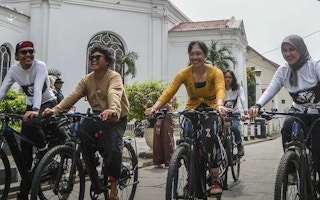Activists from environmental group Greenpeace have been blocked on their journey to Bali for the G20 Summit, which Indonesia is hosting this year.
To continue reading, subscribe to Eco‑Business.
There's something for everyone. We offer a range of subscription plans.
- Access our stories and receive our Insights Weekly newsletter with the free EB Member plan.
- Unlock unlimited access to our content and archive with EB Circle.
- Publish your content with EB Premium.
The activists have been cycling across the country to highlight the impacts of climate change in different parts of the archipelago and had planned to conclude their journey in Bali, where they would appeal to world leaders for more action on climate change.
Seventeen heads of state are expected to attend the G20 summit, which is scheduled to take place on November 15 and 16. They are still currently unnamed for security reasons.
Greenpeace’s ‘Chasing the shadow’ cycling team has been repeatedly subject to intimidation on their journey to Bali, the non-government organistion’s Indonesia head, Leonard Simanjuntak, said on Tuesday.
The group was intercepted by people belonging to the Tapal Kuda Nusantara (TKN), a pro-government non-profit organisation that helped Indonesia secure the G20 Summit, in Probolinggo, East Java, and advised not to continue their travels to Bali.
One Greenpeace activist was forced to sign a letter to confirm that the group would not carry out any campaign during the G20 Summit in Bali, Simanjuntak said.
“The team of cyclists have experienced intimidation since they were in Semarang, both from unknown people and those in police uniforms. Around seven people who claimed to be police officers had approached the Greenpeace team who were on air at a radio station,” Simanjuntak told Indonesian publication Assumption.co.
In Semarang, Greenpeace staged a photo exhibition, public discussion, and music performance to raise awareness of climate impacts such as rising sea levels.
“The government has put a lot of effort into making the G20 safe for world leaders visiting Bali. But there has also been a lot of repression of our activities. They don’t want our cycling campaign to finish in Bali,” Muharram Atha Rasyadi, a campaigner for Greenpeace Indonesia, told Eco-Business.
It was unclear at the time of publishing if Greenpeace would be continuing the cycling tour to Bali.
A major theme of the G20 Summit will be reducing emissions in response to climate change. Indonesia has committed to achieve net-zero emissions by 2060, a target critics say is insufficient and not aligned with global climate goals.
Indonesia’s civic space has been shrinking in recent years, particularly since the passing of the Omnibus Law in 2020. The pro-business law hinders the ability of public groups – particularly those with foreign backing such as Greenpeace – to challenge projects that might cause environmental and social harm.










